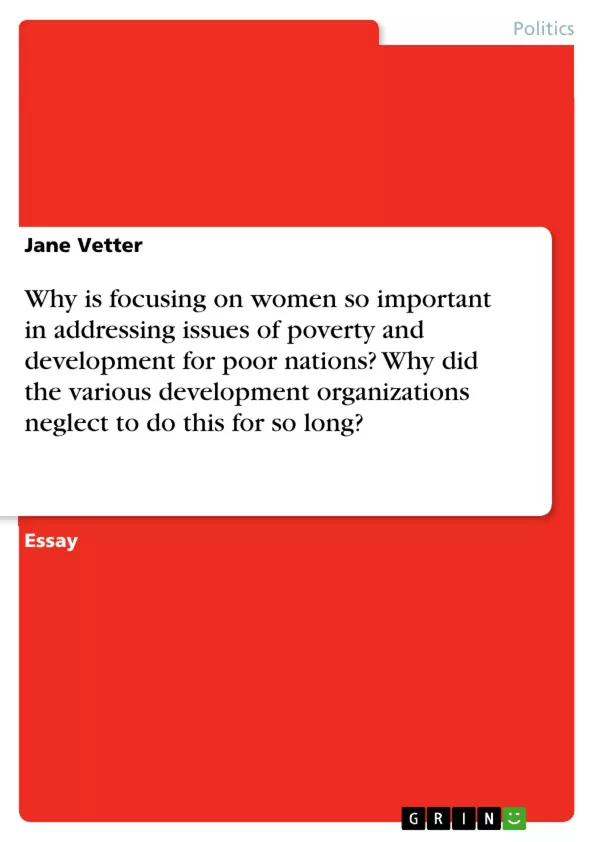Poverty is “the involuntary lack of sufficient resources to provide or exchange for basic necessities” which include food, housing, clothes, schooling and health care (Reeves 131). Development refers to “social, economic, and political structures and processes” so everybody can equally improve their standard of living by fairly sharing resources (Boulding 179). Unfortunately, it is common that women suffer more from poverty and show a greater lack of development because they often do not have the opportunity to participate in even marginal societal goals. In most instances, women are disregarded, violated or neglected since progress and development aim for and are mostly made by men. Hence, it is important to make poor women better off, improve their rights, provide at least basic requirements, and let them equally seek prosperity and development in order to overall work towards elimination of poverty.
In general, poverty is measured with the help of income and consumption. The World Bank, for example, developed two major thresholds in the amount of one U.S. Dollar and two U.S. Dollars respectively in order to show the lowest tier of the poor (Reeves 133).
Inhaltsverzeichnis (Table of Contents)
- Poverty and Development
- Measuring Poverty
- The Gender Gap and Development
- Women's Role in Development
- The Virtuous Circle and Sustainable Development
Zielsetzung und Themenschwerpunkte (Objectives and Key Themes)
This essay examines the importance of focusing on women in addressing poverty and development in poor nations. It explores the reasons why development organizations have historically neglected this aspect and analyzes the impact of gender disparities on development efforts.
- The significance of women's empowerment in poverty reduction and development
- The historical neglect of women's roles and contributions in development policies
- The impact of gender inequality on economic growth and social progress
- The importance of promoting gender equality for sustainable development
- The role of international organizations and feminist movements in advocating for women's rights and inclusion
Zusammenfassung der Kapitel (Chapter Summaries)
- Poverty and Development: This section defines poverty and development, highlighting the disproportionate impact of poverty on women and their limited participation in societal progress. It emphasizes the need to address women's needs and empower them for overall poverty reduction.
- Measuring Poverty: This section explores different methods of measuring poverty, including income and consumption, gross domestic product (GDP), and the Human Development Index (HDI). It highlights the limitations of traditional measures and emphasizes the need for more comprehensive approaches that capture women's contributions and experiences.
- The Gender Gap and Development: This section examines the historical neglect of women in development planning and policymaking. It discusses the patriarchal structures that have marginalized women's roles and knowledge, leading to inefficient development strategies. It highlights the need for a gender-sensitive approach to development.
- Women's Role in Development: This section discusses the critical roles women play in development, including their contributions to agriculture, food security, and community health. It outlines the key areas where women's participation is crucial, such as education, employment, and access to resources.
- The Virtuous Circle and Sustainable Development: This section explores the concept of the Virtuous Circle, where declining inequality leads to economic growth, higher incomes, and improved human capital. It emphasizes the importance of sustainable development practices that address both economic and social needs, with a focus on women's empowerment.
Schlüsselwörter (Keywords)
This essay focuses on the key concepts of poverty, development, gender equality, women's empowerment, sustainable development, the Virtuous Circle, and the historical neglect of women's roles in development. It examines the impact of gender disparities on economic growth and social progress, highlighting the importance of integrating women's perspectives and needs into development policies and initiatives.
Frequently Asked Questions
Why is focusing on women essential for poverty reduction?
Women often suffer disproportionately from poverty. Empowering them improves their rights and allows them to contribute equally to economic growth, which is vital for sustainable development.
Why have development organizations historically neglected women?
Historical neglect often stems from patriarchal structures where progress was defined and led primarily by men, marginalizing women's roles and knowledge in society.
What is the "Virtuous Circle" in the context of development?
The Virtuous Circle refers to a process where declining inequality leads to economic growth, higher incomes, and improved human capital, creating a self-reinforcing cycle of prosperity.
How is poverty traditionally measured, and what are its limitations?
Poverty is often measured by income and consumption (e.g., the $1 or $2 thresholds). However, these measures often fail to capture the specific experiences and contributions of women.
What roles do women play in the development of poor nations?
Women are critical contributors to agriculture, food security, community health, and education, making their participation essential for overall social progress.
- Citar trabajo
- Jane Vetter (Autor), 2006, Why is focusing on women so important in addressing issues of poverty and development for poor nations? Why did the various development organizations neglect to do this for so long?, Múnich, GRIN Verlag, https://www.grin.com/document/116464



